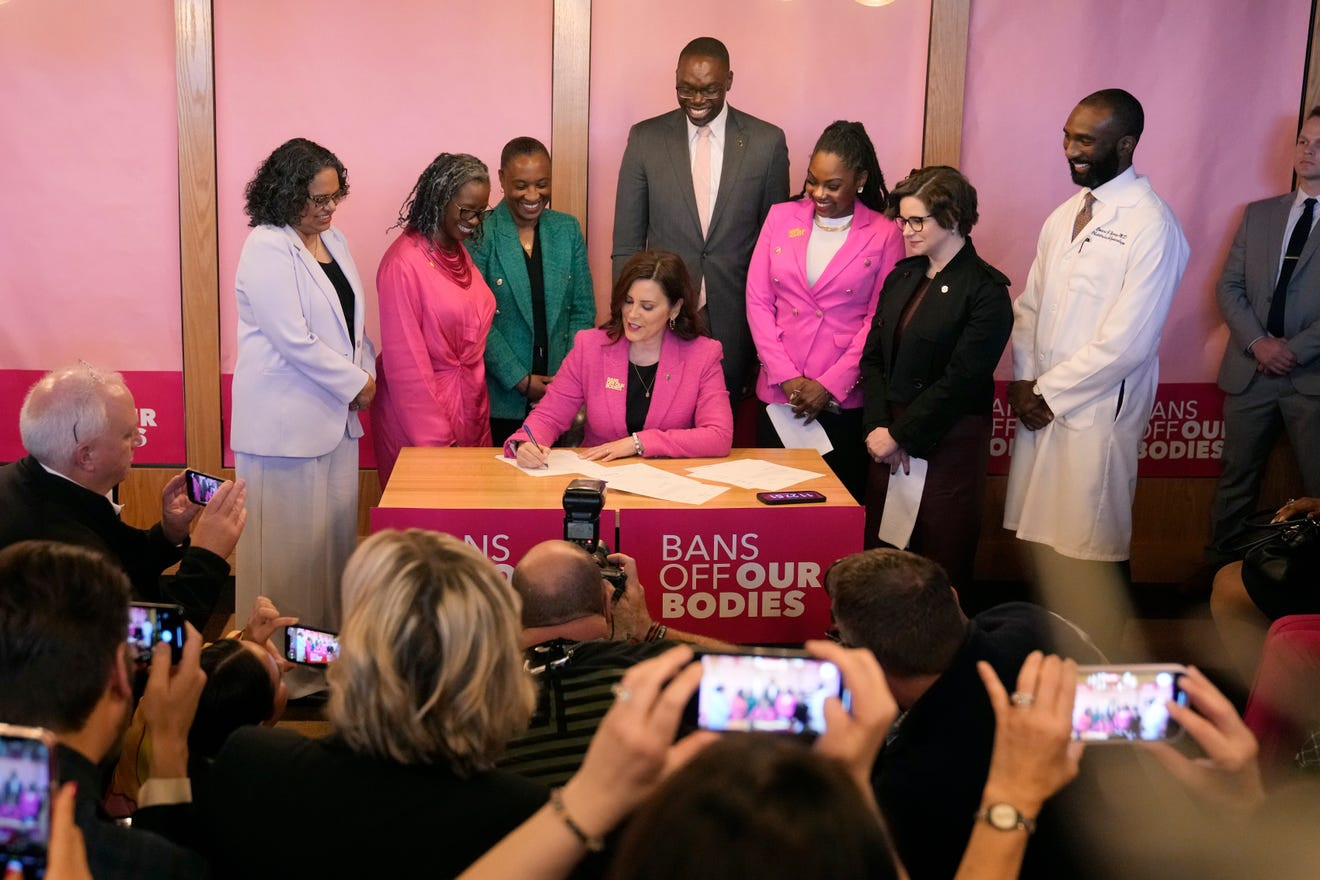This week, ProPublica reported on the story of Amber Thurman, a young mother from Georgia, whose death after being denied abortion care is heartbreaking and enraging and was completely preventable. As an emergency physician and a human rights attorney working to create access to quality reproductive health care, we know that this unnecessary tragedy is a direct result of banning abortion.
According to ProPublica’s in-depth coverage, in 2022 Thurman arrived at a Georgia emergency department seeking medical care shortly after the Supreme Court overturned Roe v. Wade and ended the constitutional right to an abortion. She was experiencing a rare but life-threatening miscarriage complication—retained products of conception. This complication can occur after any pregnancy loss. Because Georgia’s abortion ban had gone into effect after the Dobbs ruling, Thurman, a single mother of a 6-year-old son, had traveled to North Carolina, where she received medication to legally terminate her pregnancy. After complications arose, she was unable to travel the distance back to the North Carolina clinic, so she sought care in her home state.
On presentation to the emergency department, according to the time line in the article, she exhibited low blood pressure, a tender abdomen, and foul-smelling discharge during a pelvic exam—all evidence of abdominal infection. Doctors started her on fluids and antibiotics and called for an OB-GYN consult. They “noted the possibility” of a dilation and curettage, the procedure that would remove the source of her infection and is standard best medical practice to reverse the potentially fatal infection that was ravaging her body.
Although the medical care Thurman needed is not new or controversial, timely delivery is critical to success. In emergency medicine, as soon as we identify a solvable problem, we must initiate that solution. An OB-GYN was called early in her care, but it took nearly a day for Thurman to get to the operating room for intervention. By that point, it was too late. Now, two years later, the state of Georgia review board on maternal mortality has ruled her death preventable.
Georgia HB 481, the anti-abortion law that was initially passed in 2019 and enacted in 2022, became enforceable once SCOTUS overturned Roe v. Wade and eviscerated federal protection for abortion rights. This law bans all abortions after six weeks and includes an exception “that any such act shall not be considered an abortion if the act is performed with the purpose of … Removing a dead unborn child caused by spontaneous abortion.” That exception was apparently not enough for doctors to save Amber Thurman’s life.
The question about Georgia’s ban becomes: When and how is it legal to intervene to save a woman’s life if her abortion was induced versus her having a “spontaneous abortion”? Was this distinction what contributed to Thurman’s preventable death? According to ProPublica, Thurman obtained medication abortion legally in a neighboring state and returned to her home state of Georgia to be with her family and complete her miscarriage.
Lifesaving medical treatment for a patient who has had a miscarriage is the same regardless of what initiated it. In the Georgia abortion ban, the insertion of the medically unnecessary word spontaneous may be confusing physicians and delaying care that would otherwise be protected under the “life of the mother” exceptions that exist in every U.S. state.
The lethal implications of patients’ lack of access to abortion follow-up care are real. This relates not only to elective terminations but also to terminations for fetal anomalies or a new cancer diagnosis.
Thurman’s story needs to be a clarion call to physicians to act on behalf of our patients, no matter where they live. We must pledge that we will not restrict lifesaving care for specific patients that we would provide to others. It is crucial that lawyers and hospital administrators, meanwhile, support clinicians in offering necessary medical care and refusing to work in an atmosphere where they fear for their job and even liberty.
When care providers operate under confusing or vague laws, it is ultimately patients who are the most harmed. Legislators and courts have repeatedly ruled that it is on doctors, as experts, to deliver the care patients need. It’s time for them to support us in doing that. It is too late for Thurman’s family, but there are many more patients who seek emergency care, whose very lives will depend on it.
Since the Supreme Court overturned Roe two years ago, many of us have been holding our breaths, waiting for our dead woman.
Now we know her name.
It’s Amber Nicole Thurman.
She was 28 and worked as a medical assistant and had a 6-year-old son whom she loved to take to petting zoos and the beach. As was horribly predictable, in a country where Black women seek abortions at higher rates and die far more commonly from maternal-health complications, she was Black. She died because doctors in Georgia did not perform a routine procedure to remove tissue retained after a medication abortion. She had wanted a procedural abortion in Georgia, but was forced by the state’s six-week ban to travel four hours away to North Carolina, where she missed her appointment because of standstill traffic. The clinic offered her a medication abortion instead; at nine weeks, she was well within the standard of care for that treatment. The complication she suffered is rare and can be treated with a routine procedure. She died because her home state of Georgia had made that routine procedure a felony.
Now her son is starting a new school year without her.
ProPublica reported Thurman’s death Monday. It’s the first confirmed case after Dobbs where an abortion ban killed a woman. What’s most striking to me, beyond the sheer tragedy of her death, is how much work it took to confirm it. Reporter Kavitha Surana combed through death records and coroners’ reports to find cases that seemed related to abortion access. She first reached out to Thurman’s loved ones a year ago. Eventually, she obtained a document where the state’s maternal mortality review committee spelled out in black and white that Thurman’s death was “preventable.” On Wednesday ProPublica reported on a second death from Georgia’s abortion ban—that of Candi Miller, who had been warned her health was so fragile that another pregnancy could kill her. In 2022, when she became pregnant, Miller ordered abortion medication online. She experienced the same rare complication as Thurman, but she was afraid to seek care because of the state’s abortion ban. Instead, she took painkillers and suffered at home, until her husband found her unresponsive in bed with her 3-year-old daughter by her side. Given what it took to confirm that these deaths resulted from a ban, as Surana writes, “There are almost certainly others.” How many deaths have we not heard about, because finding them requires such intensive reporting?
In January, The New Yorker’s Stephania Taladrid reported on a young woman from Texas who had died two weeks after Roe was overturned from pregnancy-related complications, asking, as the headline read: “Did an Abortion Ban Cost a Young Texas Woman Her Life?” It was hard to say for sure, although it seemed the answer was yes. Yeni Glick, an aspiring scientist and certified nursing aide, suffered from health conditions, including hypertension, diabetes, and a history of pulmonary edema, that made pregnancy riskier for her. Undoubtedly, these conditions were complicated by the fact that she couldn’t afford the needed medications and prenatal care, but, as Taladrid reported, when Glick’s health collapsed during an acute hypertensive episode, her providers never gave her the option of an abortion, and she died awaiting transfer to a larger hospital. Glick’s death involved larger, structural failures like poverty and lack of healthcare access, and doubtless, many of the post-Dobbs deaths we’ve all been expecting are like hers—not the result of any one policy. They are no less tragic because of that.
It is hard to isolate the death of a young woman of color from these compounding causes in a country with the highest maternal mortality rate in the developed world. It is rare that an official document turns up that declares a death “preventable.”
But in Amber Thurman’s case, it happened. Hers is a rare case of a death we can lay squarely at the feet of a particular law. The question now is whether her death will lead to change. Will she become a rallying cry, like Savita Halappanavar, whose death after she was denied an abortion while miscarrying helped bring about the repeal of Ireland’s nationwide abortion ban? Or, like dead women from eras of lost abortion rights past, will she haunt us like a ghost, reminding our country of its failures?
I’ve been digging into the deaths of women from abortion bans for a book on the history of the anti-abortion movement, and what I’ve found so far is that anti-abortion policies tend to endure even after they’ve been traced to a woman’s death.
In 1977, Rosie Jimenez died as a direct result of the Hyde Amendment, the ban on federal funding of abortion passed in 1976. A young mother and student in South Texas, she had had two abortions before the Hyde Amendment cut off her access under Medicaid. So she went to a midwife who performed an abortion in unsterile conditions, and she contracted a terrible infection. She suffered for days in agony and left behind a daughter who grew up without a mom. We only know these facts because of the reporting of the late feminist journalist Ellen Frankfort and abortion rights activist Frances Kissling, who traveled to McAllen, Texas, and spoke to the women who knew Rosie. If not for their reporting, Rosie may have been remembered as just another Latina who went across the border for an abortion out of shame, as a Washington Post article headlined “Doubts Arise About Abortion Martyr” put it. Like Surana at ProPublica, Kissling and Frankfort were able to draw a direct line between a woman’s death and the policy that killed her, which they ultimately documented in their book Rosie: The Investigation of a Wrongful Death.
The book is now out of print, and the Hyde Amendment is still law of the land. While efforts to repeal Hyde are finally gaining mainstream traction, we’ll never know how many more Rosies are out there whom we never learned about.
In 1988, Becky Bell died at the age of 17 as a direct result of Indiana’s parental consent law. When she discovered that she was pregnant, she went to Planned Parenthood, where she learned that to get an abortion she would need parental consent or a waiver from a judge. But the judge who would have considered Becky’s case was known to be anti-abortion. Fearing that she would disappoint her parents if she told them she was pregnant, Becky found a way to end the pregnancy without telling them. She died of pneumonia from an infection caused by unsterile instruments. We only know her story because her parents, an all-American couple who had been homecoming king and queen a year apart at the same high school, decided to go public with the secret their daughter took to her grave.
Today, Indiana is one of 14 states that ban abortion outright. We’ll never know how many more Beckys are out there whose names we never learned.
Will the policy that killed Amber Thurman be allowed to stand?
The answer depends in part on the election. Georgia is a key swing state where voting rights activists have been working overtime to combat voter suppression and keep the state blue. (Voters there narrowly chose Biden and sent two Democratic senators to Washington in 2020). Vice President Kamala Harris released a statement Monday that lay the blame for Thurman’s death on Trump, saying, “This young mother should be alive, raising her son, and pursuing her dream of attending nursing school,” and she has called attention many times to the threat abortion bans pose to pregnant people’s health and lives. But there’s more to do. If I were advising Harris, I’d tell her to hold a press conference in Thurman’s hometown with a photograph of this vibrant young woman and lay her death at the feet of Republican policymakers. Perhaps such an event would help bolster local Democrats in the state who could do something about the law that killed Amber Thurman.
“Reproductive Justice advocates have been sounding the alarm for years about abortion restrictions leading to worse maternal health and emergency reproductive care outcomes,” Regina Davis Moss of In Our Own Voice said in a statement. “In Our Own Voice’s recent poll found that 40% of Black women of reproductive age feel less safe and are unsure if they want to have kids as a result of the Dobbs decision.”
Beyond this election, Thurman’s legacy will depend on reproductive health and justice activists, who on Monday responded to her death with a resounding sense of outrage that was even more profound because they all knew this day was coming.
Monica Simpson, executive director of SisterSong, echoed the sentiment: “This is the reality of being a Black woman seeking care in an anti-abortion America. We are dying.”
As ProPublica reported, attorneys for the state of Georgia had chosen to ignore these warnings. When advocates tried to block the six-week ban that killed Amber Thurman by voicing concerns that it would endanger women, the lawyers accused them of “hyperbolic fear mongering.” Two weeks later, Amber was dead.
The ban did exactly what we all knew it was going to do.
But the sheer predictability of her death should deepen, rather than dampen, our outrage.


















